Why Books Are Banned
Examining 30+ Years of American Library Association Challenges
Julie Roberts
Introduction
For avid readers, one of life’s greatest delights is selecting the next book to read. Some of us use genre, topic, or author to guide us in our choices; others might simply make their decisions based on what’s available at their bookstore or library. Ultimately, it doesn’t really matter how we pick our books, but what is important is that we have a voice in the selection process. When we are in search of reading material, we are looking for something that engages both our intellect and imagination. Our choice of reading material represents more than just a simple diversion; it’s a reflection of our interests, studies, and values.
That’s why, when someone attempts to challenge or ban books, many of us feel that our valuable right of self-determination is at risk. Rather than having the opportunity to decide for ourselves — in our roles as readers, parents, or teachers — if a book is worth reading, someone is telling us that our opinions are irrelevant. They’re saying, essentially, that they should decide what we should read — and, ultimately, how we should think and feel about any given topic.
Fortunately, readers have a powerful resource on their side: the American Librarian Association (ALA), which has been compiling lists of the most challenged written works for about 30 years and holds an annual Banned Books Week to educate the public about censorship and to encourage reading (“Banned and Challenged Books”). But what does it even mean to initiate a challenge, and how is that different from banning? Let’s clarify the definitions:
- A challenge is an attempt to remove a book from a library or classroom.
- When the book is actually removed from the classroom or library, that’s considered to be a ban.
Interesting Facts About Book Challenges and Bans
The Supreme Court has weighed in on the topic.
In a 1982 case, the Supreme Court ruled that “local school boards may not remove books from school library shelves simply because they dislike the ideas contained in those books and seek by their removal to prescribe what shall be orthodox in politics, nationalism, religion, or other matters of opinion” (“Banned in the USA”). In the same ruling, the Court acknowledged that school boards do have broad authority in school management but called for “established, regular, and facially unbiased procedures for the review of controversial materials” (“Banned in the USA”).
Book challenges aren’t new, but they have been especially prevalent in recent years.
In 2021, the American Library Association (ALA) reported the highest number of attempted bans ever recorded, with 729 censorship attempts and 1,597 books affected (“Banned and Challenged Books”).
Book bans are not widely popular.
A 2022 poll commissioned by the ALA revealed that 71% of voters polled opposed efforts to remove books from libraries (“Voters Oppose Book Bans”).
Another common practice among educators is selection, which is “defined as the process of choosing to include or omit certain books from classroom, curricula, and libraries” (Hintz and Tribunella 479). Librarian and scholar Lester Asheim proposed selection as a positive alternative to censorship, saying, “The selector’s approach is positive, while that of the censor is negative. … The selector says, if there is anything good in this book let us try to keep it; the censor says, if there is anything bad in this book, let us reject it” (Hintz and Tribunella 479).
Now let’s address the most pressing question: why do parents and other community members object to certain books? The primary objections raised, according to the ALA, are:
- sexual content (92.5% of books on the list)
- offensive language (61.5%)
- unsuited to age group (49%)
- religious viewpoint (26%)
- LGBTQIA+ content (23.5%)
- violence (19%)
- racism (16.5%)
- use of illegal substances (12.5%)
- “anti-family” content (7%)
- political viewpoint (6.5%)
(“Top 10 Most Challenged Books Lists”)
A review of some of these thought-provoking readings tells us so much about American society — including evolving parental concerns, sociopolitical trends, and religious influences. While all the works on the ALA’s lists are worth exploring, let’s take a look at a few that have generated intense public scrutiny based on these primary objections.
Sexual Content
On the list of most challenged works, one author’s name comes up time and time again: Judy Blume, author of numerous teen fiction titles including Forever, Blubber, and Are You There, God? It’s Me, Margaret. The characters in these books are mostly teenagers dealing with ordinary teenage events, and Blume’s titles are loved by young readers who are dealing with similar life situations.
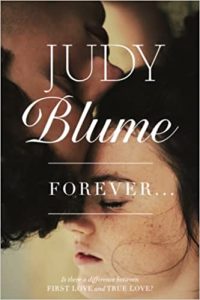
Blume has received letters of appreciation from her fans for years, and she published a volume with their stories. The musician Amanda Palmer has even written a song about Blume. “I realized that she’d opened up all these emotional doors and windows that started off locks, and I’d taken it totally for granted. It was such a eureka moment that I had to write her a song,” she recalls (Flood).
Regardless of the fandom, adults in the 1970s and beyond have criticized Blume’s works for their frank descriptions of masturbation, birth control, and sex — to name just a few reasons. Blume says that she didn’t intend to generate backlash with her writing; she was simply using her own recollections of being a teenager as a guide. When she started receiving challenges to her work, she was dismayed. “My feeling in the beginning was wait, this is America: we don’t have censorship, we have, you know, freedom to read, freedom to write, freedom of the press, we don’t do this, we don’t ban books. But then they did,” she says (Flood).
Offensive Language, Violence, and Use of Illegal Substances
Published in 2017, The Hate U Give by Angie Thomas tells the story of Starr Carter, a 16-year-old who becomes a social justice activist after witnessing her best friend’s shooting at the hands of police officers. Inspired by the Black Lives Matter movement, the book has earned praise by critics and won multiple awards, including the Coretta Scott King Award in 2018.
Despite the acclaim, The Hate U Give has been repeatedly challenged because of the characters’ use of profanity and illegal substances, among other concerns. Because of parents’ complaints, this book was temporarily taken off the shelves at schools in a Texas school district in 2017. In response, teens who wanted to read The Hate You Give flooded the Harris County Public Library system with requests (Rosenfield).
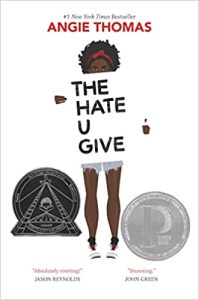
This example highlights one of the most counterintuitive aspects of the banned book issue — namely, that bans can generate more interest in and exposure to the literary work, especially if it has received media attention. For example, sales for Maus I and Maus II, the acclaimed graphic novels by Art Spiegelman, jumped by over 50% after the texts were banned by a Tennessee school board in February 2022 (Chojnacki).
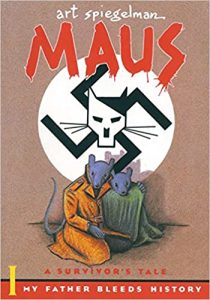
While many have cited offensive language, violence, and use of illegal substances as the reasons for challenging The Hate U Give, Thomas thinks it’s far likelier that objectors want to avoid uncomfortable conversations about police brutality. “There are exactly 89 instances of the F-word in The Hate U Give. … But last year alone, over 800 people lost their lives at the hands of police brutality. That number is far scarier. So when you’re telling me it’s the language, no, that’s not what it is. You don’t want to talk about the topic” (Sterba).
In response to parents who think The Hate U Give’s content — particularly the discussions about police brutality — is too intense for young readers, Thomas responds, “I would say to those parents that this is a discussion that needs to be had, and if it’s something you feel like you can shy your child away from, realize that there are parents in this country who don’t have that privilege” (Coffey).
Unsuited to Age Group
And Tango Makes Three, an award-winning picture book written by Justin Richardson and Peter Parnell and illustrated by Henry Cole, has been consistently challenged since its publication in 2005 for being “unsuitable for young children,” among other reasons. Based on a true story, Tango tells the story of two male penguins living at a zoo who hatch an egg together; the baby penguin is named Tango, and the threesome become a family (“Banned: And Tango Makes Three”).
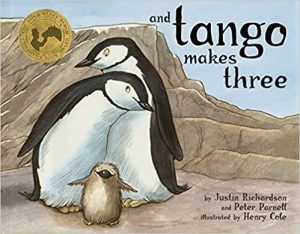
In speaking about their inspiration for writing Tango, Richardson and Parnell cited the need for parents to have picture books that reflect the diversity of families. “This story seemed to us a perfect way for them to open a discussion of about queer families with the confidence of knowing that they were doing it in an age-appropriate way,” they explain (Moye).
While Tango’s authors wanted their story to be suitable for young readers, not everyone viewed their work that way. In addition to being challenged for not being age appropriate, parents have also objected to Tango based solely on the subject matter. For example, one California resident challenged the book at the Lodi Public Library, decrying what she called a “homosexual story line that has been sugarcoated with cute penguins” (“Banned Books 2020”).
Richardson and Parnell knew that their book might be controversial, but they were still surprised at the intensity of the vitriol against Tango, which was the number one most-challenged title for three years in a row (“Banned & Challenged Books”). While the authors feel that they are in good company with other prestigious authors who are also featured on the ALA’s lists, they don’t always relish that distinction, saying that being banned feels “painful and infuriating” (Moye).
Religious Viewpoint
One of the most widely read books in history — The Holy Bible — achieved the dubious honor of being featured on the ALA’s most challenged list in 2015 based on its “religious viewpoint.” It’s undeniable that the Bible certainly has a religious viewpoint; it also has its share of sex and violence. However, it’s possible the text was challenged more for symbolic reasons. Ryan Cragun, a sociologist who studies secularization, believes that the Bible appeared on the list due to the efforts of secular activists who just wanted to make a point. “They want to show that there’s a double standard that allows the Bible in but not other books, even though the Bible is a book filled with morally questionable actions,” he theorizes (Kuruvilla).
Interestingly, in that same year, other religiously themed books made the ALA’s list — specifically, Nasreen’s Secret School: A True Story from Afghanistan by Jeanette Winter. That title, along with The Librarian of Basra: A True Story from Iraq (also written by Winter), was targeted by a small group of parents in Florida. Seeking additional reinforcement to help them protest these books, the parents posted on Facebook, saying, “If we cannot promote praying to God and Jesus Christ in our public schools, how can we promote reading the Koran and praying to Muhammad?” (Holpuch).
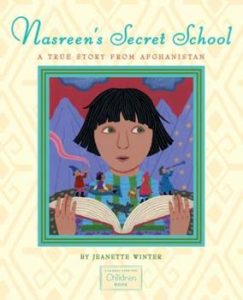
Anti-Family, LGBTQIA Content, Sex Education, Political Viewpoint
Published in 2014, Beyond Magenta: Transgender Teens Speak Out by Susan Kuklin is one of those rare books that has received a wide array of objections, including the four listed here. Beyond Magenta is a compilation of real transgender teens’ experiences; the stories in the book focus primarily on the process of transitioning.
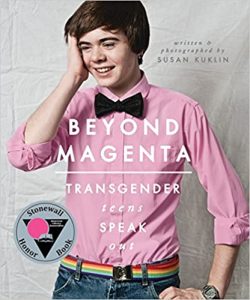
When asked about why she thinks Beyond Magenta made the top ten challenged list of 2015, Kuklin replied, “It’s scary to people because they don’t understand it. Once you get to understand it, it’s no longer frightening. But there’s that period before it happens, where there’s so much pushback and so much fear” (“Books Under Attack”).
Beyond Magenta marks a growing trend of opposition to books with LGBTQI content. In fact, when Beyond Magenta first made the ALA’s list in 2015, four of the top 10 titles (including Fun Home by Alison Bechdel, I Am Jazz by Jessica Herthel and Jazz Jennings, and Two Boys Kissing by David Levithan) also dealt with LGBTQI issues (“Books Under Attack”).
While Kuklin is concerned about the criticism of Beyond Magenta, she does appreciate the positive feedback she has received from many readers. “I’ve gotten the most beautiful letters from people, including some young transgender people who were considering suicide,” Kuklin said. “In fact, I’ve gotten at least six emails from people from here, in Japan, from England, who just didn’t know what to do, and then [they] read the book and just felt so clear about who they were and what their next steps were” (Alcorn).
Racism
One literary work that frequently appears on the ALA’s list may be a surprise to some: To Kill a Mockingbird by Harper Lee. Published in 1960, Mockingbird is set in Alabama and is told through the perspective of six-year-old Scout Finch, whose father, attorney Atticus Finch, is representing a black man who has been accused of raping a white woman. The book is generally considered to be an American classic and has been a part of school curriculum reading lists for decades.
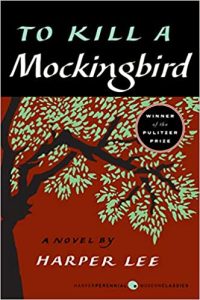
But just because To Kill a Mockingbird is widely cherished doesn’t mean it isn’t also controversial — and not just because of its depictions of racism. It was challenged as early as 1966 by a Virgina school board, citing objections to the rape content and claiming the book was “immoral.” The challenges continued into the 1970s and 1980s, with complaints about Mockingbird’s “trashy” content and racial slurs (Little).
Formal opposition to Mockingbird continued into the 2000s, with objections raised about how the book could be considered degrading to African Americans, among other reasons. In 2020, the Burbank Unified School District in California directed its middle-school and high-school teachers to remove Mockingbird (along with several other titles) from the curriculum based on challenges from parents who were concerned about how the book might impact black students. Nadra Ostrom, one of the parents who filed a complaint, explains that the book lacks diverse voices, saying, “The portrayal of Black people is mostly from the white perspective. There’s no counter-narrative to this black person dealing with racism and a white person saving them” (Pineda).
Others assert that Mockingbird should still be included in school curriculum as a part of the selection process, but that it should be taught differently. Geoffrey Glover, a lecturer at the Department of English at the University of Pittsburgh, says that modern-day discussions of the book should “de-center whiteness” and that “we should be de-romanticizing Atticus [Finch].” He further elaborates by saying that Mockingbird can be taught in different ways for different age groups. “I would argue that you may need to teach it more than once. Revisiting it would encourage students to actually see their growth in their understanding of racism as a systemic process and their growth in their participation in that system, whether voluntary or not” (“Q & A: Should Teachers Still Assign To Kill a Mockingbird?”).
Conclusion
In analyzing these specific entries in the ALA’s lists, it’s not easy to find simple and predictable patterns. But one thing is certain: as long as books are being published, there will inevitably be objections to content that people consider to be salacious and offensive. And, in response to these efforts to censor the books, there will be pushback from librarians, teachers, free speech advocates, and readers.
But it’s also important to note that the mere exercise of banning is evidence of the sheer transformative power of books. If parents, political activists, and religious figures are working so hard to take books off the shelves, that only makes literature more valuable and reinforces the importance of reading as a provocative and essential act of self-expression.
Works Cited
Alcorn, Davis. “Book Chronicling Transgender Teens to Remain on Chesterfield School Shelves.” VPM.org, 23 Aug. 2022, https://vpm.org/articles/35025/book-chronicling-transgender-teens-to-remain-on-chesterfield-school-shelves.
“Banned & Challenged Books.” Advocacy, Legislation & Issues, 20 Feb. 2020, https://www.ala.org/advocacy/bbooks/.
“Banned: And Tango Makes Three.” PBS, Public Broadcasting Service, https://www.pbs.org/wgbh/americanexperience/features/banned-and-tango-makes-three/.
“Banned Books 2020 – And Tango Makes Three.” Marshall Libraries, 21 Apr. 2022, https://www.marshall.edu/library/bannedbooks/and-tango-makes-three/.
“Banned in the USA: The Growing Movement to Censor Books in Schools.” PEN America, 11 Oct. 2022, https://pen.org/report/banned-usa-growing-movement-to-censor-books-in-schools/.
“Books Under Attack.” CBS News, CBS Interactive, 14 May 2016, https://www.cbsnews.com/news/books-under-attack/.
Chojnacki, Robert. “Press Coverage of ‘Antiracist Baby’ and Other Banned Books Led to Increased Sales, NPD Says.” The NPD Group, 26 May 2022, https://www.npd.com/news/press-releases/2022/press-coverage-of-antiracist-baby-and-other-banned-books-led-to-increased-sales-npd-says/.
Coffey, Freddie. “Angie Thomas: We Have to Get Uncomfortable.” Guernica, 3 Sept. 2020, https://www.guernicamag.com/angie-thomas-we-have-to-get-uncomfortable/.
Flood, Alison. “Judy Blume: ‘I Thought, This Is America: We Don’t Ban Books. But Then We Did.’” The Guardian, Guardian News and Media, 11 July 2014, https://www.theguardian.com/books/2014/jul/11/judy-blume-interview-forever-writer-children-young-adults.
Hintz, Carrie, and Eric L. Tribunella. Reading Children’s Literature: A Critical Introduction. Broadview Press, 2019.
Holpuch, Amanda. “Florida Parents Try to Ban Children’s Books Set in Iraq and Afghanistan.” The Guardian, Guardian News and Media, 20 July 2015, https://www.theguardian.com/us-news/2015/jul/20/florida-parents-ban-childrens-books-iraq-afghanistan.
Kuruvilla, Carol. “The Holy Bible Is Now One of the Most Challenged Books in America.” HuffPost, HuffPost, 13 Apr. 2016, https://www.huffpost.com/entry/the-holy-bible-is-now-one-of-the-most-challenged-books-in-america.
Little, Becky. “Why ‘to Kill a Mockingbird’ Keeps Getting Banned.” History.com, A&E Television Networks, 16 Oct. 2017, https://www.history.com/news/why-to-kill-a-mockingbird-keeps-getting-banned.
Moye, Kellee. “Interview with Justin Richardson and Peter Parnell, Authors of And Tango Makes Three.” Unleashing Readers, 2 June 2022, https://www.unleashingreaders.com/24498.
“Q & A: Should Teachers Still Assign To Kill a Mockingbird?” University of Pittsburgh, 23 July 2020, https://www.pitt.edu/pittwire/features-articles/qa-should-teachers-still-assign-kill-mockingbird.
Pineda, Dorany. “In Burbank Schools, a Book-Banning Debate over How to Teach Antiracism.” Los Angeles Times, Los Angeles Times, 12 Nov. 2020, https://www.latimes.com/entertainment-arts/books/story/2020-11-12/burbank-unified-challenges-books-including-to-kill-a-mockingbird.
Rosenfield, Kat. “Why Did a Texas School District Ban the Year’s Most Popular YA Book?” Vulture, Vulture, 4 Dec. 2017, https://www.vulture.com/2017/12/the-hate-u-give-katy-texas-school-district-ban.html.
Sterba, Gretchen. “The Real Reason the Hate U Give Became a Banned Book.” The List, The List, 27 Nov. 2022, https://www.thelist.com/1117204/the-real-reason-the-hate-u-give-became-a-banned-book/.
“Top 10 Most Challenged Books Lists.” Advocacy, Legislation & Issues, 20 Sept. 2022, https://www.ala.org/advocacy/bbooks/frequentlychallengedbooks/top10.
“Voters Oppose Book Bans in Libraries.” Advocacy, Legislation & Issues, 1 Apr. 2022, https://www.ala.org/advocacy/voters-oppose-book-bans-libraries.

